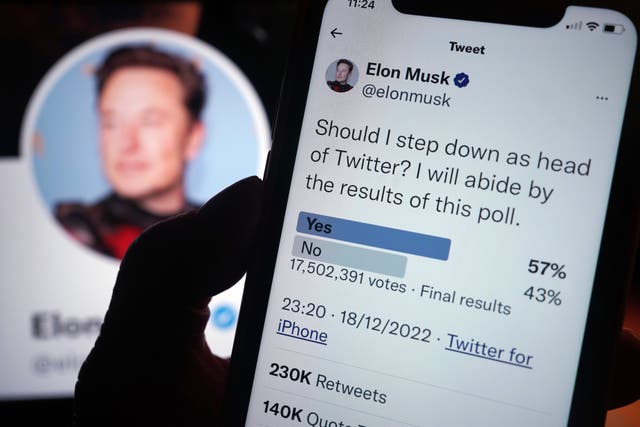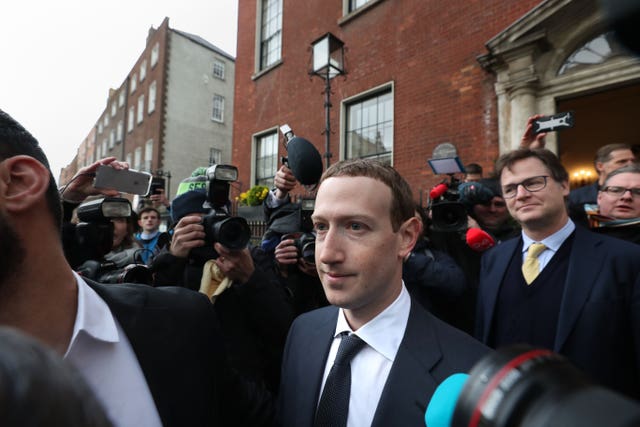It has been a year of drastic change in the tech sector, with Elon Musk taking over at Twitter while an economic downturn sparked major shake-ups and staff cuts across the industry.
Here is a look at some of the biggest tech stories of the year.
– Elon Musk’s Twitter takeover
The big tech story of the year started in April when Twitter company filings revealed that billionaire Tesla and SpaceX boss Elon Musk had quietly built up a substantial percentage of shares in the company.
A frequent tweeter, Mr Musk had begun expressing an interest in how the platform was being run at the beginning of the year as he debated online with his followers about Twitter’s purpose as part of global discourse.
Things quickly accelerated and Twitter announced that their new biggest shareholder had been offered a place on the board, but just days later the Tesla boss reversed his decision to join it and instead submitted an offer to buy the company and take it private.
After months of publicly sparring with Twitter executives and pulling out of the deal briefly, Mr. Musk completed the deal in late October and celebrated with a tweet that included a bad sink pun.
The chaos that many experts and commentators predicted would come with a Musk-led Twitter then began to play out quickly – around half of the company’s global workforce was laid off, content moderation was loosened and Musk himself engaged with conspiracy theories and right-wing personalities on the site.
Some experts and analysts reported drastic spikes in hate speech on the site.
Meanwhile, nervous advertisers started to pause their ad spend on the platform – diminishing a vital revenue source for the company.
The Tesla boss’ remedy for this was to launch a new subscription service that enabled any user to be verified on the site simply by paying a monthly fee, but this system had a chaotic rollout which saw some use the scheme to impersonate public figures and spread abuse and misinformation, which saw the launch paused and pushed out again several weeks later.
The constant controversies sparked debate over Twitter’s place in public discourse and even its future as users began to move to a handful of rival sites.
As questions swirled over Musk’s leadership of the company, he toyed with the idea of standing down as chief executive – he hosted a poll where Twitter users told him he should step down, but he appeared to ignore that result for several days before finally confirming he would step aside as soon as he finds someone “foolish enough” to take on the role.

As 2022 draws to a close, the damage to Twitter and Mr Musk’s reputations remains substantial after a messy few months, with no clarity and only uncertainty on what lies ahead in 2023 for what is a vital online tool for many.
– The tech sector downturn
It has been a difficult year across the board for the tech industry, as the global economic slowdown hit firms hard after the pandemic years where many had seen substantial growth as millions more people moved online during lockdowns.
As the world slowly moved back closer to normality, online revenues fell back too, particularly in advertising, and as the global economy also began to struggle, spending in general but in particular advertising spending dropped further – leaving some of the biggest tech firms with shortfalls that needed addressing.
The result has been major job cuts at some of the biggest firms.
Aside from Elon Musk’s halving of Twitter’s global workforce of more than 7,000, Facebook parent firm Meta cut 11,000 jobs globally while Snapchat and Microsoft also made cuts during the year.
The downturn shook the confidence of investors, who for some time had felt the biggest names in the tech sector were almost above the impact of general global economic headwinds.
– Problems at Meta
For one company in particular, the economic difficulties of 2022 have shone a light on broader issues within the company.
Mark Zuckerberg’s Meta is currently pouring billions of dollars a year into the idea of the metaverse – the 3D virtual world the Facebook founder believes will become the next version of the internet, where people will meet, socialise, work and visit to be entertained.
Accessed through virtual reality headsets, the metaverse is envisioned as a way people can go anywhere and see anything, as well as interact with others through virtual avatars of themselves.
Meta says the possibilities could involve things like holding a virtual work meeting on the International Space Station or taking a primary school history class to ancient Rome.
Crucially, it does not yet exist in any substantial form and the technology underpinning it – VR – still has not caught on as a mainstream product nearly a decade after being brought to consumers.
In addition, many experts are skeptical if the idea on the scale Mr Zuckerberg is imagining is even remotely possible or likely.
In short, many believe the Facebook founder is taking a very high-risk, expensive gamble on the future of his company, just at a time when economic conditions are worsening.
Meta’s financial results have shown a steady decline this year – how long will investors allow that to continue before asking for a rethink on the metaverse?

.